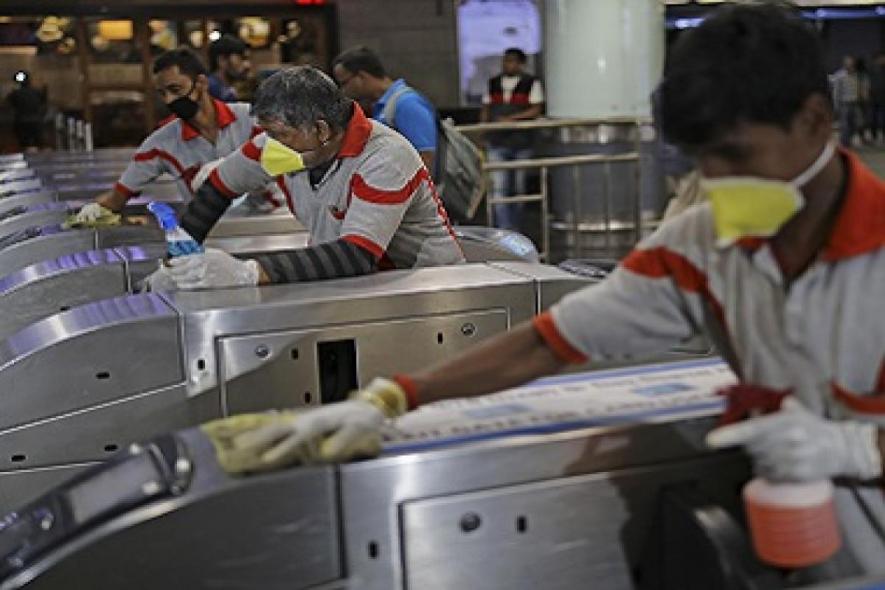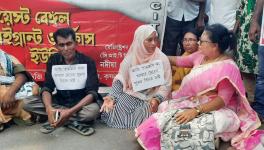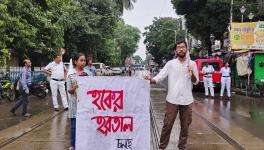COVID-19: ‘Stop Evictions, Distribute food,’ Say Unions, Workers Worst Affected

Image Courtesy: Firstpost
As India grapples with a stuttering economy coupled with an overburdened healthcare system, anxieties among the working classes have been triggered with the coronavirus pandemic.
Workers fear job retrenchment, working without economic and social support, and worry about how to feed their families and earn an income. Workers unions across India are urging the central government to come up with a comprehensive response to the pandemic that is rooted in both physical distancing and infection control with increased social protection and economic support to workers.
Strengthen public distribution, stop wage cuts:
The spread of the virus is triggering down-sizing and shutdowns of production, services and other economic activities owing to restrictions. A drastic reduction of business has started, with its entire burden to be transferred onto the working class, resulting in loss of livelihoods and earnings. Workers in the informal sector (93 million as per official estimates), migrant workers, casual and temporary workers, contract workers of both the private and public sector are the worst affected. In the private sector, wage cuts, unpaid forced leave and retrenchment of casual and contract workers has begun.
A.R. Sindhu, the National Secretary of the Center of Indian Trade Unions told NewsClick that “we are witnessing an unprecedented crisis. In the formal sector, measures such as work from home come with their own dangers as they might become permanent cost cutting methods for the employers. In the informal sector it becomes worse with people panicking as daily-wage workers have nowhere to go, including health workers, who become particularly vulnerable. We are demanding that food and ration needs to be provided across sectors and that there should not be any wage cut. We want the government to legally notify this, sending out a clear cut message,” he added.
In a statement, the CITU demanded that the Central Government should announce a large-scale scheme to be implemented through the states which would rescue livelihoods and provide income support to the most vulnerable. That Governments, both at the Centre and the state must directly intervene without further delay. Their demands also included no wage- cuts, adjustment of leave, and for free ration to informal sector workers, given the huge stock of food grains at the Government’s disposal.
Given the vulnerability of workers from the informal sector, many are now urging the government to stall any evictions from homes, and aim to bring the focus of the government to broader issues of food security and distribution of ration. Speaking to NewsClick, Chandan Kumar of the National Working People’s Charter said: “The biggest question is who will be given benefits and who will not; a large number of people who are self employed and who have no alternative livelihood will have to be taken care of. Every state needs to take a call on the minimum wages and give one month minimum wage as the immediate support. Three month PDS system has been declared in states like Maharashtra and
West Bengal. Even migrant workers need to be taken care of, therefore PDS needs to be made the biggest priority at the local level.”
He added: “Another important thing is the eviction of slums, we want to stop evictions midst the crisis and we are also demanding mobile clinics to ensure the protection of those living in slums. Recently, the Bombay High Court also ruled in favor of stopping evictions.”
Highlighting these demands, the Right to Food Campaign, said:
-
PDS rations should be enhanced (say doubled) on a temporary basis, until the crisis is over.
-
The coverage of the PDS should be expanded, by fast-tracking all pending applications for ration cards as well as for addition of missing names in existing ration cards.
-
The decision to suspend biometric authentication in the PDS is helpful. But instead of switching all electronic Point-of-Sale (ePoS) machines to offline mode, the government is imposing the OTP system. This system is unreliable (e.g. due to poor connectivity) and prone to abuse. Instead of the OTP system, the government should immediately switch all ePoS machines to offline mode.
-
Emergency action must be taken against corrupt dealers and functionaries – some of them may take advantage of the confusion to siphon off people’s rations.
-
The state government should proactively pay the unemployment allowance (one fourth of the NREGA wage for the first 30 days, one half thereafter) to all SC/ST job-card holders, for the duration of the crisis.
-
The government should consider providing weekly income support to all workers of the state – migrants or informal-sector workers. Some of these measures (e.g. expansion of PDS) will be easier to take with the support of the central government, but the state government should take the initiative. Some states, notably Kerala, have already taken extensive measures of this sort.
Get the latest reports & analysis with people's perspective on Protests, movements & deep analytical videos, discussions of the current affairs in your Telegram app. Subscribe to NewsClick's Telegram channel & get Real-Time updates on stories, as they get published on our website.























